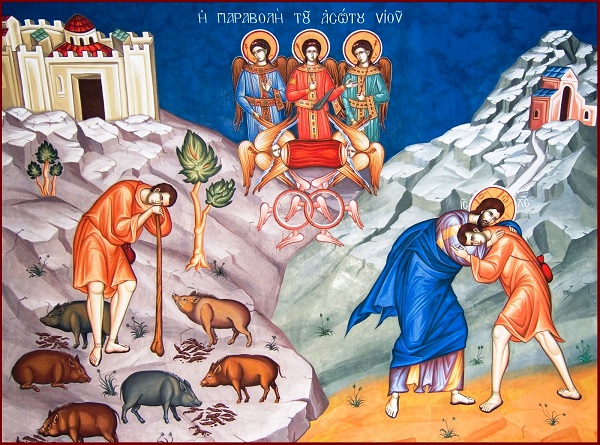God’s Great Love for Us
15 February 2020‘But he became angry and did not wish to enter’.
The parable of the Prodigal Son, which is read today in church, has been called a pearl among the parables, and the Gospel within the Gospel. Some commentators have called it the Parable of the Elder Son. Indeed, the behavior of the elder son is striking. On his return home, he was told of the return of his younger brother. He refused to enter the house and accused his father of being unfair to him. The charge was based on the fact that he worked day and night and wasn’t properly rewarded, unlike the prodigal son who’d spent his substance on harlots but who, when he came back, was given a warm welcome. Let’s look at the elder son in the parable.

Who is the elder son?
Most commentators say that the elder son represents the Pharisees. They didn’t like the fact that publicans and sinners went to Christ, listened to him and that some, no doubt, repented. ‘The Scribes and Pharisees murmured that he received sinners and ate with them’ (Luke 15, 12). This charge against Christ was of long standing and abiding, which is why Christ sought to change their outlook with parables such as those of the lost sheep and the lost coin. Saint John Chrysostom writes that everything can be borne if it’s for the salvation of others. Each human soul is so precious to God that He sacrifices even His Son, the fatted calf, for our salvation.
Another interpretation of the elder son is that he represents the saints of the Church. Those saints who had borne the burden and the heat of the day, who had labored in the Lord’s vineyard from the first hour, who had obeyed God’s commandments, demanded that justice be served. That God should reward the pious and condemn the impious. The saint were astonished at God’s great merciful kindness, since He immediately forgives those who return to Him in repentance. Indeed, He gives them the same gifts as He gives the saints. It’s as if the saints remonstrate (metaphorically, of course, not literally) with God for exhibiting such scandalous behavior of mercy and loving-kindness towards sinners. This demonstrates that human justice is very different from that of God.
A misconception on the part of pious people.
People who work spiritually within the Church often feel superior to sinners and can’t accept that the latter might repent, change their life and, in the end, can be saved. They themselves have done good works and have never betrayed God’s trust. But then along comes the Lord, Who emphasizes that repentance is a greater act than our supposed good works. Saint Cyril of Alexandria says that salvation is a gift from God to us and not the result of good works, be they many or few.
People judge and condemn on the basis of what they see, but human criteria are one thing; those of God another. By human measure, the robber, the harlot, the tax collector and any amount of other people shouldn’t be saved. In His boundless love, however, and by His own criteria, He saves them. Abba Isaac said: ‘God may be called just, but even more so is He good and kind’. He asks of us that we give ourselves. That we give Him all our spiritual vim and vigor. When it comes from the depths of our heart, a sigh is of greater weight than a potful of emotional tears, according to Saint Païsios. Let us approach God in humility and with the intention of shattering our egotism, so that we may be saved.






